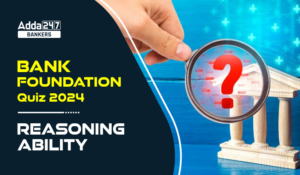Directions (1-10): Read the following passage carefully and answer the questions given below it. Certain words are given in bold to help you locate them while answering some of the questions.
The Reserve Bank of India’s decision to keep the policy interest rate unchanged, and reaffirm its “neutral” policy stance, clearly indicates that policymakers at the central bank are singularly focussed on their primary remit of ensuring price stability while supporting economic growth. That the RBI’s Monetary Policy Committee has chosen to do so in the face of clamour for a rate cut, and Consumer Price Index data and the bank’s own survey of households’ inflation expectations appearing benign, points to the MPC’s determination to reassert the central bank’s independence, especially in the rate-setting realm. Laying out its reasoning for opting to remain “watchful”, the RBI has raised pertinent questions relating to the outlook for price stability, the foremost being whether the “unusually low momentum in the reading for April will endure”. It posits that the easing trend in inflation, excluding food and fuel, may be transient given its vulnerability to rising rural wage growth and strong consumption demand. And the elephant in the room, in the MPC’s opinion, is the real prospect of inflationary spillovers from the rising risk of fiscal slippages caused by farm loan waivers — Uttar Pradesh has set the stage, and Maharashtra’s government has vowed to come up with the State’s largest-ever. Observing that inflation has fallen below 4% only since November 2016, the RBI has reiterated its commitment to keeping the headline reading close to that figure on a “durable basis”.
The MPC acknowledges that the latest monsoon forecast augurs well for the agriculture sector, and when viewed in conjunction with continuing robust government spending, it ought to help undergird overall momentum in the economy. The RBI’s business expectations index based on its industrial outlook survey of April points to upbeat prospects for the manufacturing sector in the second quarter of the current fiscal year, spurred by rising rural and overseas demand. However, on the growth front too the RBI’s policy panel has opted for caution given that the Central Statistics Office’s GDP and GVA (gross value added) data released last month suggest that the effects of demonetisation have lingered on. The RBI has accordingly cut its GVA growth forecast for the year ending in March 2018 by 10 basis points to 7.3% and flagged the risks that global political uncertainties, rising input costs and wage pressures and the twin balance sheet problem (an over-leveraged corporate sector and stressed lenders) pose to a revival in private investment demand and a more durable economic expansion. Spelling out the priorities, the MPC has said monetary policy can be effective only when private investment has revived, the banking sector’s health is restored and infrastructure bottlenecks are removed. To do otherwise “risks disruptive policy reversals later and the loss of credibility” of the RBI.
Q1. How the economic approach can be efficacious according to the Monetary Policy Committee?
(i) By raising input costs and wage pressures and the twin balance sheet problem.
(ii) By cutting the Gross Value added growth forecast.
(iii) By improving banking sector’s condition.
(a) Only (i) is correct
(b) Only (iii) is correct
(c) Both (i) and (ii) are correct
(d) Both (ii) and (iii) are correct
(e) All are correct
Q2. According to the passage, what is the RBI’s strategy for reinforcing economic growth?
(a) Cutting the GDP and GVP growth forecast.
(b) Observing the inflation rates in every second quarter of the current fiscal year.
(c) Keeping the policy interest rates unchanged.
(d) Raising input costs and wage pressures and the twin balance sheet problem.
(e) All of the above
Q3. What is the author’s tone in the passage?
(a) Descriptive
(b) Argumentative
(c) Analytical
(d) Satirical
(e) Didactic
Q4. What is the major concern of RBI regarding farm loan waivers?
(a) The risks that global political uncertainties pose to a revival in private investment demand.
(b) Rise in inflation from the risk of fiscal slippages.
(c) Inflation spillover due to increase in demand and rising input costs.
(d) Both (a) and (c) are correct.
(e) All are correct
Q5. Which of the following is an appropriate title in context of the passage?
(a) The Unchanging Policy interest rate
(b) The Consumer Price Index data of RBI
(c) Central Statistics Office’s GDP and GVA
(d) RBI’s monetary policy decision
(e) The inflationary spillovers
Q6. Which of the following is false in context of the passage?
(a) The latest monsoon forecast herald well for the agriculture sector.
(b) “The monetary policy can be effective only when private investment has revived” MPC said.
(c) The RBI has cut its GVA growth forecast by 10 basis points to 7.3%.
(d) The RBI’s Monetary Policy Committee has chosen to keep the policy rate unchanged in the face of clamour for a rate cut.
(e) All are true
Directions (7-8): Choose the word/group of words which is most similar in meaning to the word/group of words printed in bold as used in passage.
Q7. Benign
(a) previse
(b) hostile
(c) endure
(d) favourable
(e) relevant
Q8. Pertinent
(a) considerate
(b) appropriate
(c) straggle
(d) abide
(e) dwindle
Directions (9-10): Choose the word/group of words which is most opposite in meaning to the word/group of words printed in bold as used in passage.
Q9. Undergird
(a) construe
(b) enervate
(c) Undermine
(d) fractious
(e) inure
Q10. Bottlenecks
(a) aid
(b) adamant
(c) admonish
(d) predict
(e) hapless
Directions (11-15): There are two different sentences with a blank space in each question. Choose the word from the given options which fits into both the blanks appropriately without altering their meanings.
Q11. (1) The only difficulty in this ______________ is to secure debtors that will not die.
(2) She was in a state of rare contentment, an _____________ to the gaiety that was hers by nature.
(a)accretion
(b)increase
(c)enlargement
(d)accessory
(e)None of the above
Q12. (1) He issued what was in reality an _________________ proclamation, which President Lincoln was compelled to modify.
(2) Friction increased between the races at the South after ___________________.
(a)abolition
(b)autarchy
(c)exemption
(d)immune
(e)emancipation
Q13. (1) It was feared that there could be a __________________ unsettling of established governments and a new political order could come into being, oriented away from the traditional leadership of the region.
(2) On the other hand, __________________ emigration was not sufficient to remove the evil.
(a)comprehensively
(b)wholesale
(c)voluminous
(d)extensive
(e)haphazard
Q14. (1) The French President Emmanuel Macron’s new centrist party is ______________ poised for a landslide victory in the parliamentary elections.
(2) The opinion of parliament on two other questions during the session was, ______________, influenced by events in France.
(a)evidently
(b)seemingly
(c)ostensibly
(d)apparently
(e)All of the above
Q15. (1) Parliament takes pride in asserting the supremacy of the institution, at times even ignoring what it perceives as judicial _______________ in its functioning.
(2) It would have been enough to have cured the whole Roxburghe Club from _______________ with libraries and books forever and ever.
(a)concern
(b)examining
(c)tracing
(d)meddling
(e)quest
Solutions
S1. Ans. (b)
Sol. Refer to the last few lines of second paragraph of the passage “the MPC has said monetary policy can be effective only when private investment has revived, the banking sector’s health is restored”. Hence only sentence (iii) is correct.
S2. Ans. (c)
Sol. Refer to the first few lines of first paragraph “ The Reserve Bank of India’s decision to keep the policy interest rate unchanged, and reaffirm its “neutral” policy stance, clearly indicates that policymakers at the central bank are singularly focussed on their primary remit of ensuring price stability while supporting economic growth”.
S3. Ans. (a)
Sol. The tone of the author here is descriptive as the author presents the detail report of the news.
S4. Ans. (b)
Sol. Refer to the last lines of first paragraph “And the elephant in the room, in the MPC’s opinion, is the real prospect of inflationary spillovers from the rising risk of fiscal slippages caused by farm loan waivers”. Hence sentence (b) is true.
S5. Ans. (d)
Sol. The author describes about the RBI’s monetary policy decision of unchanging policy rates. Hence sentence (d) is the correct choice.
S6. Ans. (e)
Sol. All of the given statements are true in context of the passage.
S7. Ans. (d)
Sol. Benign means benevolent or favourable. Hence it has same meaning as favourable.
Previse means predict.
S8. Ans. (b)
Sol. Pertinent means relevant or applicable to a particular matter; apposite. Hence it has same meaning as appropriate.
Straggle means an untidy or irregularly arranged mass or group.
S9. Ans. (c)
Sol. Undergird means provide support or a firm basis for. Hence it has opposite meaning as undermine.
Fractious means easily irritated or annoyed.
Inure means cause to accept or become hardened to.
Construe means make sense of.
Enervate means weaken mentally or morally.
S10. Ans. (a)
Sol. Bottlenecks means blockage/impediment. Hence it has opposite meaning as aid.
Adamant means refusing to be persuaded or to change one’s mind.
Admonish means scold.
Hapless means unfortunate and deserving pity.
S11. Ans. (a)
Sol. Accretion means a thing formed or added by gradual growth or increase.
S12. Ans. (e)
Sol. Emancipation means the fact or process of being set free from legal, social, or political restrictions; liberation.
S13. Ans. (b)
Sol. Wholesale means done on a large scale; extensive.
S14. Ans. (e)
Sol. All the given options fit into the blanks appropriately as all four words mean the same i.e. so as to give the impression of having a certain quality; apparently.
S15. Ans. (d)
Sol. Meddling means interfering in something that is not one’s concern.





 General Awareness Quiz for Bank Mains Ex...
General Awareness Quiz for Bank Mains Ex...
 English Language Quiz For Bank Foundatio...
English Language Quiz For Bank Foundatio...
 Reasoning Quiz For Bank Foundation 2024 ...
Reasoning Quiz For Bank Foundation 2024 ...





